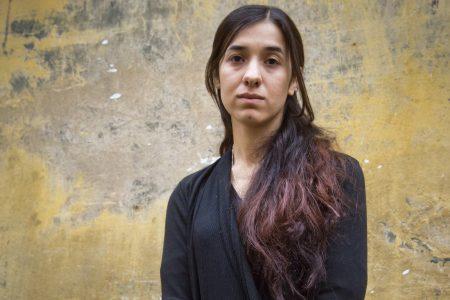
ISIS sex slave was raped in hospital after trying to kill herself to escape torment
An ISIS sex slave who tried to kill herself said she was raped in her hospital bed while she hearing the desperate cries of her sister being raped next door.
The Iraqi girl’s story has been released as part of a number of horrific accounts from girls and women kept as sex slaves by Islamic State and Boko Haram.
Other Islamic State slaves said members would touch the chests of captured girls to see whether they had grown breasts and if not they would check again a few months later.
One girl said she was told by Muslim women that “you have to be raped to become a Muslim”.
The harrowing details were released alongside a report that claims terrorists are using human trafficking, including trading in sex slaves, as a new source of funding.
Groups, including Isis and Boko Haram, are turning to hostage-taking and ransom efforts as historical revenue streams such as taxation and oil sales dry up, the research found.
The study by foreign policy and security think tank the Henry Jackson Society suggests kidnapping brought in £7.6 million to £22.8 million for Isis last year.
The report, headed by researcher Nikita Malik , also details how extremists are using sexual violence, including rape, sexual slavery, and forced marriage, to boost recruitment, galvanise fighters and punish disbelievers.
Victims cited in the study include a 10-year-old Libyan girl who was repeatedly raped by traffickers while she was being held in a camp.
Another victim said she was lured by a family friend into ISIS.
She said she was able to keep her phone, but when an ISIS member found it, they stripped her, withheld food and water from her for three days, and beat her daily.
When she attempted suicide after being forced to identify her friend’s body when she took her own life, she was then taken to hospital by a guard who raped her when she was under the influence of sedatives.
She said could hear her sister being raped in the next room during the attack.
Another girl said she became pregnant after being raped by an Islamic State fighter so she tried to throw herself down the stairs to have a miscarriage.
The girl said ISIS monsters would check girls chests and if they had breasts, they could be raped – if not, they would wait three months to check again.
She said she was also raped by six men in one night when she tried to escape and also raped in the bathroom while she had her period.
The girl said Muslim women told her that “you have to be raped to become a Muslim” and that Islamic State fighters told her the repeated attack to implement the Prophet Muhammad’s law.
Yvette Cooper, chairwoman of the influential Commons Home Affairs Select Committee, said: “Isil, Boko Haram and other evil groups are increasingly seeing human trafficking as a possible revenue stream – and we know that terrorists use sexual violence as one of the weapons they use to divide and create fear within communities.
“It is important this is recognised in the interpretation of terror in our current laws.”
The report, entitled Trafficking Terror, found terrorists are using organised crime tactics such as money laundering, migrant smuggling, human trafficking, drugs and firearm smuggling, with sexual slavery markets commonplace in Islamic State-controlled areas of Iraq and Syria.
Author Malik, concluded that financial gain is a key driver behind sexual slavery, with ransom payments linked to sexual violence.
She said: “The international community must recognise and address the nexus between this criminality and security.
“Historical revenue streams, including taxation and oil sales, to groups such as Islamic State and Boko Haram are decreasing.
“These are being replaced with hostage-taking and ransom efforts, meaning modern day slavery may increase as Daesh struggles to sustain its financial reserves.”
The report recommends British laws, including the Modern Slavery Act and Terrorism Act, should be interpreted more broadly to reflect sexual violence being used as a tactic of terrorism.
The findings were welcomed by the Government’s former independent reviewer of terrorism legislation, Lord Carlile, who said: “It highlights the imperative need for more international cooperation, to break up the trafficking gangs and routes, which are so essential for their wicked trade in human beings.”
Source: Mirror





